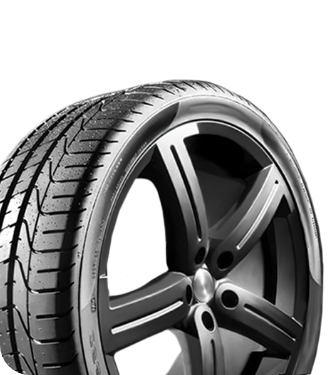

All-Season vs. Winter Tires: The Differences Explained
Tires |When it comes to tire options for your vehicle, the choice between all-season and winter tires is significant, especially as seasons change and driving conditions vary. Understanding the differences between these two types of tires can help you make an informed decision for your specific needs and circumstances. Below, we compare and explain the differences between all-season and winter tires so you can shop for new tires with confidence.
Performance on Dry, Wet, and Icy Roads
All-Season Tires
All-season tires provide versatile performance across a variety of conditions. On dry roads, all-season tires generally perform well, offering adequate grip and handling.
However, their performance can wane in extreme conditions—particularly hazardous winter conditions. On wet roads, all-season tires feature tread patterns that help channel water away, reducing the risk of hydroplaning. That said, their performance is still behind that of specialized tires in heavy rain or standing water.
Winter Tires
Winter tires, on the other hand, are specifically for cold weather conditions. They excel on icy and snowy surfaces, thanks to their unique rubber compounds that remain flexible even in freezing temperatures. The tread patterns on winter tires bite into snow and ice, providing superior traction and braking performance.
While they also perform adequately on dry roads, their soft rubber can wear out faster in warmer conditions. Still, winter tires outperform all-season tires in severe winter weather by a significant margin.

Tread Life and Overall Durability
All-Season Tires
When considering tread life and durability, all-season tires generally offer a longer lifespan. They can withstand a wide range of temperatures and conditions, making them more durable over time. Many all-season tires come with treadwear warranties ranging from 60,000 to 80,000 miles, providing long-term value for the initial investment.
Winter Tires
Winter tires, while exceptional in cold weather, tend to have a shorter tread life—especially when operating outside of typical winter conditions. The rubber compounds that make them effective in winter conditions also make them more prone to wear in milder climates.
Typically, winter tires last around 30,000 to 40,000 miles. Many drivers switch to winter tires only in the winter and then remove them at the outset of spring to preserve them for another season.
Cost Comparison
All-Season Tires
Initial investment and long-term value are critical factors to consider for any car owner. All-season tires generally come with a lower initial cost than winter tires. Their versatility also means you won’t need to buy an additional set for different seasons, which can be a cost-saving factor. Over time, their longer tread life further enhances their value proposition, making all-season tires a budget-friendly option for many drivers.
Winter Tires
Winter tires are undoubtedly more expensive than all-season tires because of their specialized rubber and tread compounds. But while these special tires are more costly up front, they provide unparalleled safety and performance in harsh winter conditions.
Therefore, the investment in winter tires pays off in terms of safety and peace of mind during winter months. Plus, using winter tires can prolong the life of your all-season tires, as you don’t use either year round. So, when considering cost, don’t forget to account for the prolonged life of your all-season and winter tires over the years.
Fuel Efficiency Differences
All-Season Tires
Fuel efficiency is another crucial aspect to consider when choosing between all-season and winter tires. All-season tires are typically more fuel-efficient than winter tires since their tread patterns are shallower and rubber compounds lighter, reducing rolling resistance.
The lower the rolling resistance of the tire, the less energy your vehicle expends to move, which means greater efficiency. All-season tires balance practicality, durability, and efficiency to provide a well-rounded value to drivers.
Winter Tires
Winter tires, with their aggressive tread patterns and softer rubber compounds, have a higher rolling resistance. This can lead to a slight decrease in fuel efficiency, especially when operating outside of wintery conditions.
The principal objectives of winter tires are safety and traction, not fuel efficiency. To achieve greater safety and traction, drivers must make trade-offs, and fuel efficiency is one of them for winter tires.
Safety Features and Benefits
All-Season Tires
Safety is paramount when it comes to choosing the right tires. All-season tires offer a balanced approach, with rubber compounds and tread patterns to balance performance and safety in various conditions.
They include tread patterns that effectively channel water away and compounds that offer decent grip year round. For many drivers, especially those in regions with mild winters, all-season tires provide a satisfactory level of safety and performance.

Winter Tires
Winter tires shine with cold-weather safety features. The main objective of these tires is to effectively handle snow, ice, and slush, so they offer superior grip and braking performance.
The special rubber compounds and tread designs significantly reduce stopping distances on icy roads, which can be a lifesaver in emergencies. You may have to pay more and sacrifice in other areas of tire performance, but there’s no doubt that winter tires are the safest choice for drivers in snowy and icy climates.
Seasonal Storage and Maintenance
All-Season Tires
A key difference between all-season and winter tires we must explain is the seasonal storage requirements. Since all-season tires are generally applicable for year-round use in regions with mild winters and summers, they don’t require storage when the seasons change. This convenience factor makes them a popular choice for many drivers who prefer a low-maintenance solution.
Winter Tires
Winter tires require seasonal changeovers, typically in the fall and spring, to ensure optimal performance and tread life. This means you’ll need to store your off-season tires, which you might consider a hassle.
Proper storage is crucial to maintaining the integrity of the rubber compounds, so you’ll need a cool, dry place to keep the tires when not in use. However, the added effort of seasonal maintenance ensures that you always have the right tires for the current driving conditions, enhancing safety and performance.
Environmental Impact
All-Season Tires
Many drivers nowadays are caring more about environmental impact when choosing new tires. All-season tires generally have a lower ecological footprint due to their longer lifespan and reduced need for seasonal replacements.
Their durability means the manufacturing and disposal of fewer tires over time, thereby lowering overall waste. Also, since they’re more efficient than winter tires, all-season tires contribute to decreased CO2 emissions as drivers spend less fuel on the road.
Winter Tires
Winter tires, while providing essential safety during cold weather, often require more frequent replacement due to their shorter tread life. The production and disposal of these tires add to the environmental burden. When in conjunction with all-season tires, winter tires can last for multiple winter seasons, but on their own, their durability and higher rolling resistance make them less environmentally friendly.
Get All-Season or Winter Tires at RNR Tire Express!
Whichever tires you think are ideal for your vehicle, we’ve got them at the RNR Tire Express tire shop in Clovis! Our wide inventory includes all kinds of specialized tires, whether you’re looking for seasonal safety, performance, or durability. Browse our selection online and schedule an appointment to outfit your car with new tires today.





